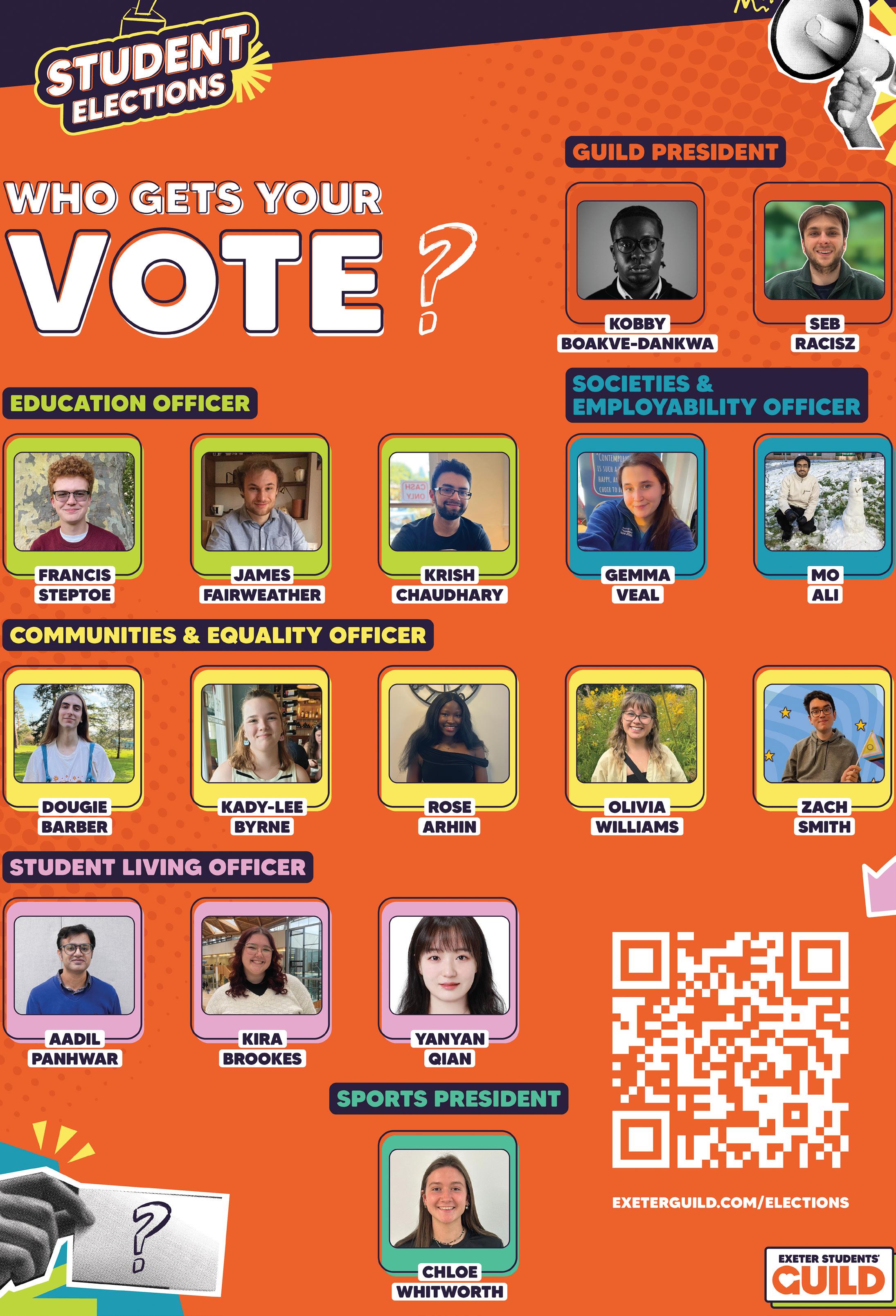e
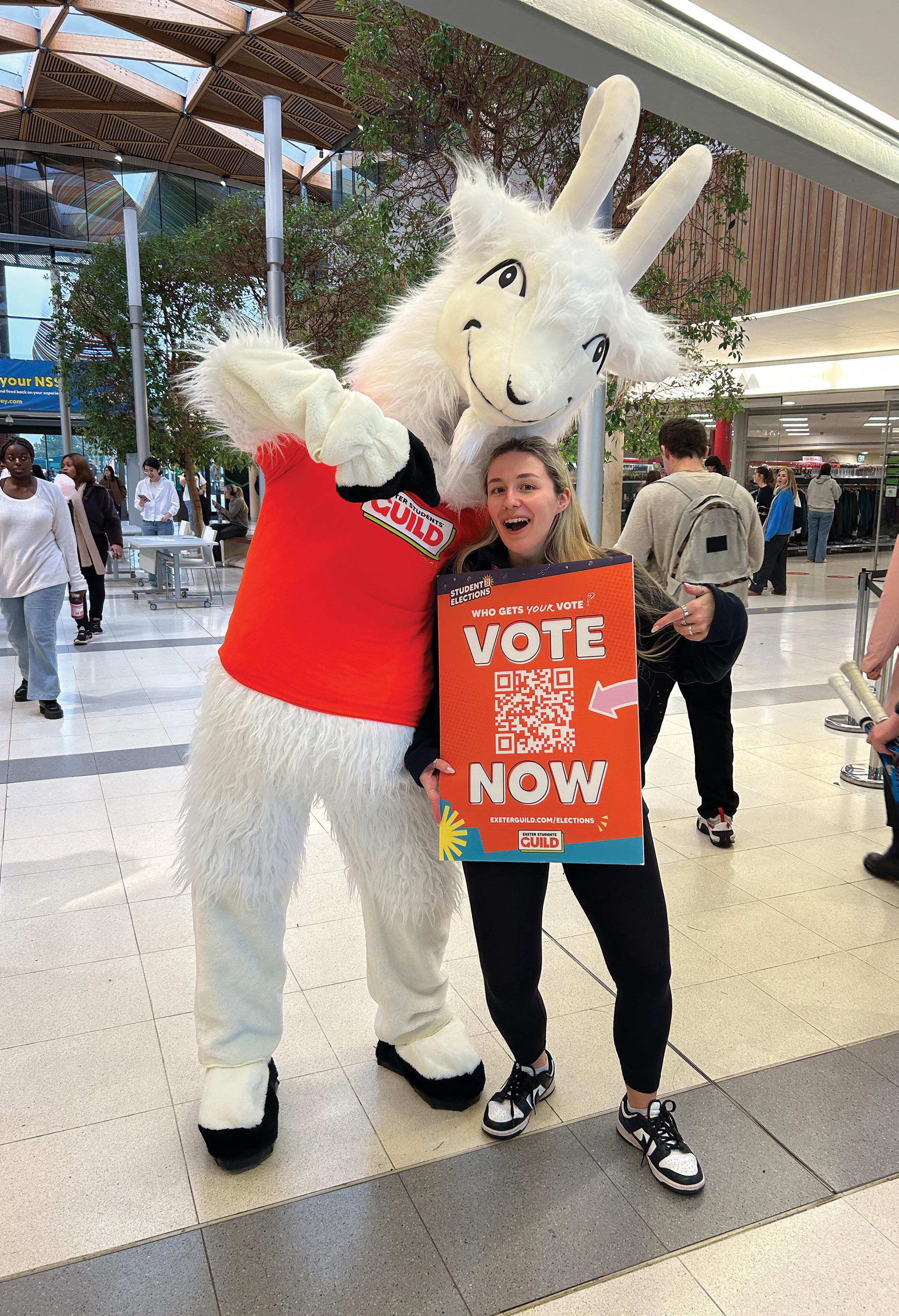






Statements have been reviewed by the Guild to ensure election rules compliance and any elements that are non-compliant have been removed
Exeposé is thrilled to produce another special edition for the 2025 Exeter Student’s Guild elections. Our coverage includes interviews with 14 of the candidates, covering all the electable roles. We were unable to talk to Mo Ali (Societies & Employability Officer) or Yanyan Qian (Student Living Officer), but their full candidate statements, as well as the candidate statements of all other contenders can be found on the Students’ Guild’s election website. We have also included an Exeposé verdict at the end, alongside details on how to cast your vote. We’d like to give a special thanks to all candidates who participated and for contributors for giving up their time to help. Keep any eye out on our social media and website too for the latest news on the elections and on campus. We hope you enjoy reading this issue!
Designed and edited by CHARLIE GERSHINSON



@Exepose
@Exepose
@Exepose
According to the Students’ Guild, “The Guild Full-Time Officer Team are 5 elected students who work as employees of the Guild to represent all students and influence change across the Guild, University and City.
“Officers act as trustees of the Guild, help decide our direction as an organisation, and represent the voice of over 35,000 students in high-level decision making at the Guild and University.
“The Officer roles are full-time, paid roles, open to all students. As it’s a full-time job, the 25/26 Officer team will be paid over £25k for the year, alongside 6 weeks annual leave + bank holidays!
“ We also elect the Athletic Union’s (AU) Sports President (also a full-time paid role) who works with the University to improve the sports offering at Exeter.”
Recent achievements by Full-Time Officers include:
• Led major campaigns for the benefit of students e.g., the £2 meal
• Spoken at National conferences on issues that affect students e.g., safety and housing
• Influenced the Universities mitigation policy by adding evidence-free extensions
GUILD PRESIDENT
SPORT PRESIDENT
EDUCATION OFFICER
COMMUNITIES & EQUALITY OFFICER
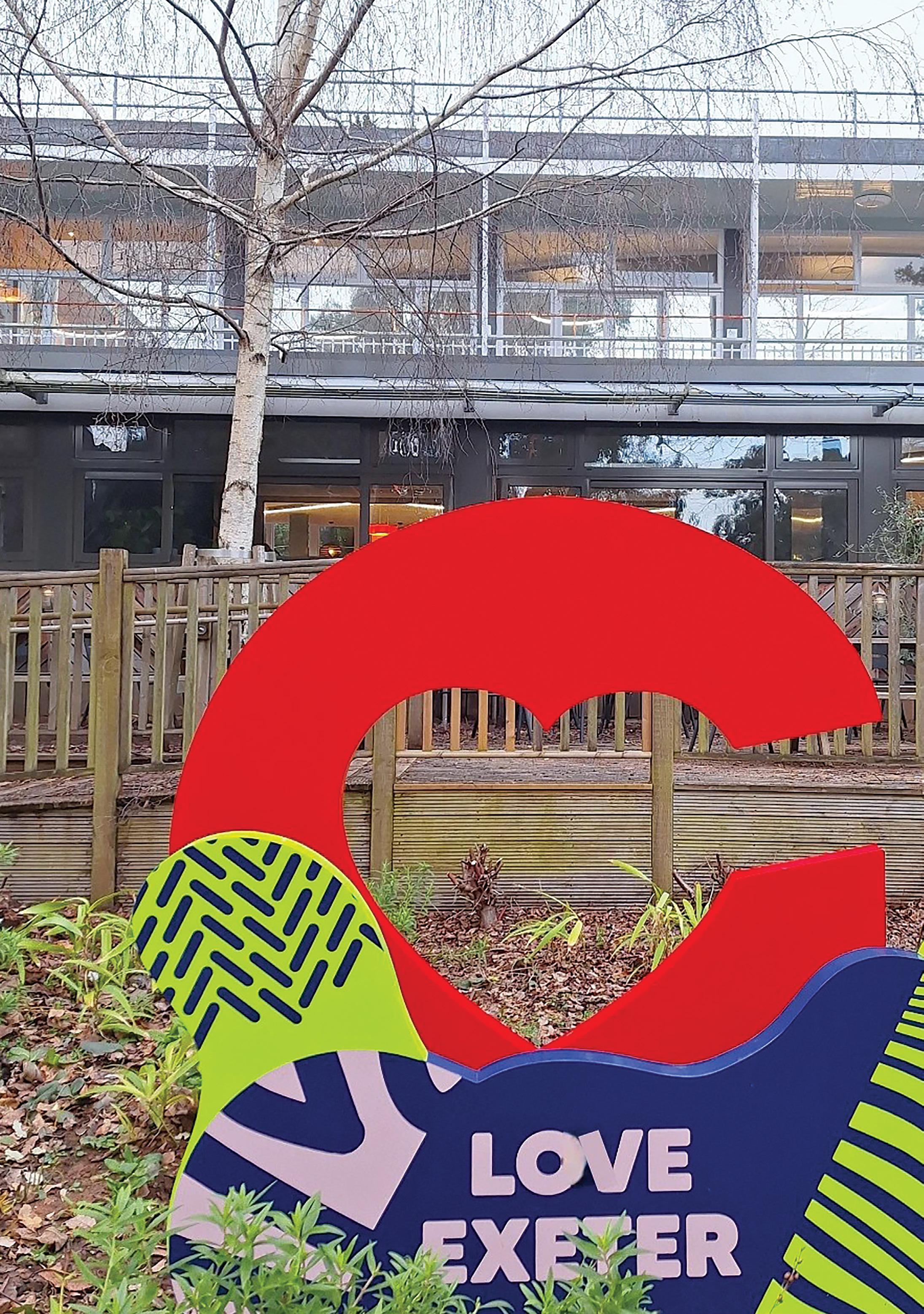
STUDENT
KOBBY BOAKYE-DANKWA
Hi guys, my name is Kobby, I’m British-Ghanaian originally from London, I enjoy reading and binge-watching Netflix series. I am passionate about culture, learning, and connecting with others. I thrive on creativity, diversity, and meaningful interactions, and I strive to leave a positive impact wherever I go.
WHAT MADE YOU WANT TO BE GUILD PRESIDENT?
HOW WOULD YOU APPROACH THE ROLE OF GUILD PRESIDENT?
WHAT IS THE BIGGEST CHALLENGE YOU WILL FACE IN THE ROLE?
WHAT IS YOUR BIGGEST WEAKNESS?
HOW WILL YOU MAKE SURE THAT YOU REPRESENT ALL STUDENTS’ VIEWS?
WHAT IS YOUR MOST MEMORABLE EXPERIENCE IN EXETER?
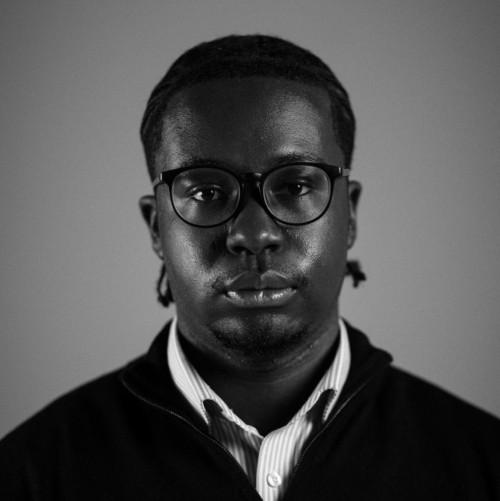
I want to be Guild President to bring about inclusivity, diversity and create a positive impact during my time, if I were to potentially become Guild President. I want to make sure students’ voices are heard and their queries and the things that they struggle with are put at the forefront of the University, whether it’s mental health, whether it’s financial problems, whether it’s academic stress. It’s making sure that I can take that up to the higher-ups and that their problems matter and they will get resolved.
In a relaxed way. Relaxed in the sense of making sure students’ voices are heard, making sure their representation matters and making sure all the problems they face are brought to the forefront. But, also making sure that I use the power that I have in a good way, and so not in an autocratic way or as an autocratic leader, but more in the sense of it being laissez-faire. So the problems that you have filter up and I’ll do my best to implement those problems that you’re facing, whether it’s students of colour, whether it’s LGBTQ+ students, whether it’s international students, your voice matters and you can be in a place where you are supported, thrive and do the best that you can.
One of the things that I would like is healthy conversations with the higher-ups and making sure I’m able to implement all the things I want to be able to implement. I want to do exactly what is necessary for me to bring about change, whether that be a big or small change, and making sure I can bring about change in a positive way to the University and the Guild.
The fact that I can be very intense in the sense that I have a lot of ideas in what I want implemented and when they can’t be implemented, that can cause me a lot of frustration. I can put a lot of stress on myself to achieve, overachieve and perform. You can look at that as a positive, but it can be a weakness as overperforming is something that I expect of myself.
Making sure that I speak to all of the societies at Exeter, whether that’s the ACS society (African and Caribbean Society)or the BFS society (Business and Finance Society), etc. Seeing what change societies and students want regardless of their race or religion, I will make sure that the changes these groups want — big or small — are brought to the forefront of the agenda.
The hills! Cardiac Hill is definitely hard to go up and down from every day. Going to All Stars and playing pool with my coursemates is also really fun.
SEB RACISZ
Hiya, I’m Seb, and over the last half-year, I’ve had the privilege of fighting for your needs as your Education Officer. I’m a working-class student hailing from Tottenham, a Polish-English Dual National and someone who cares deeply about building systems without barriers. And now, I’m running to be your Guild President to continue the fight and give you a system you can trust!
WHAT MADE YOU WANT TO BE GUILD PRESIDENT?
HOW WOULD YOU APPROACH THE ROLE OF GUILD PRESIDENT?
WHAT IS THE BIGGEST CHALLENGE YOU WILL FACE IN THE ROLE?
WHAT IS YOUR BIGGEST WEAKNESS?
HOW WILL YOU MAKE SURE THAT YOU REPRSENT ALL STUDENTS’ VIEWS?
WHAT IS YOUR MOST MEMORABLE EXPERIENCE IN EXETER?
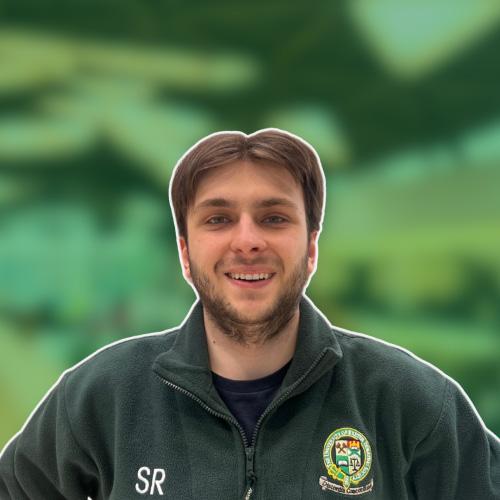
I think a large part of it is just wanting to have a bigger impact on Exeter. Serving as Education Officer, I have been able to have an impact on the University side of things. But I want to have a look at Exeter as a whole. Like things that would usually fall out of my realm — housing, the cost-of-living crisis. I think those things are really making a huge impact on student life right now. And I want to help change that.
Coming from already having been in the Guild, I want to pick up from where Alex [Martin, current Guild President] left off, and a lot of previous Presidents. There has been a lot of good work there. I think it’s really crucial, while we’re doing this, to make sure that there is trust. And that the Student Guild is being trusted again. I think naturally, there has been a bit of a falling out recently. And I want to start rebuilding that.
The biggest challenge is probably going to be dealing with the current state of the sector, if that makes sense. Higher Education has never been in a more dire place than it is now. None of it seems to be working from student loans to how universities are funded more generally. I think in the next couple of years, we’re really going to see universities like Exeter, and more generally, Russell Group universities, starting to cut out on what we think are basic provisions. I think as Guild President in the next year, it’s going to be a real fight to make sure that the University doesn’t start cutting out really crucial things like wellbeing.
I think one of my biggest problems is going to be overworking. Having served as Education Officer, oh my god does it get everything out of you! I’ve been told by previous Presidents that it’s really exhausting. I think balancing working and free time is going to be my biggest challenge.
I am who I am as a person and that limits me in directly representing views. I think a large chunk of it is building mechanisms so that representation can exist, so that it isn’t just me. I don’t think I can speak for everybody’s experiences and I want to build stuff to let the organisation do that. Picking up representative systems that aren’t the traditional ones like elections, and instead something more radical like a citizens’ assembly.
That’s a good question. I think one of my most memorable experiences is probably running in last year’s Guild Election. It really gets everything out of you. But it’s so incredibly rewarding and I’ll never forget it for the rest of my life.
CHLOE WHITWORTH
Hello everyone, I am Chloe Whitworth, and I am re-running to be your Sports President for the 2025-26 academic year. This year, I’ve championed inclusivity, accessibility, and visibility, building a diverse and communicative Athletic Union. During my time at Exeter I have sat on a sports committee for two years, as well as the AU Executive Committee as EDI Officer, gaining unparalled insight into Exeter Sport. I am dedicated to creating an inclusive and forward thinking Exeter Sport.
WHAT MADE YOU WANT TO BE SPORT PRESIDENT?
WHAT IS THE BIGGEST CHALLENGE YOU WILL FACE IN THE ROLE?
HOW WILL ENSURE YOU REPRESENT ALL SPORTS GROUPS, REGARDLESS OF LEVEL, GENDER, PRESTIGE, ETC.?
WHAT IS YOUR BIGGEST WEAKNESS?
WHAT IS YOUR MOST MEMORABLE EXPERIENCE IN EXETER?
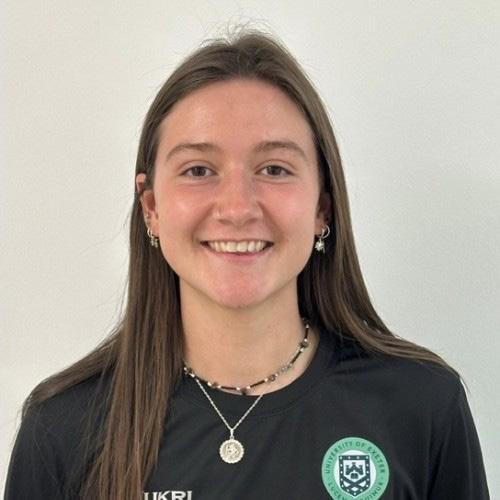
I am currently in the role right now, and I have loved it, and had so much fun. I have realised how much there is to do in the role, and even though 12 months is not a very long period of time, so having another 12 months to get some really good work done would be super beneficial. I am really passionate about student’s experiences, and I would love to continue to help students.
The big one is the time restrictions, and then figuring out what you can do in the year. I have a lot of aspirations in terms of what I want to do in the role, in areas like visibility and inclusion, and a lot of campaign ideas. I think prioritisation and figuring out what’s doable in the amount of time will be helpful, so I would love to have another year to focus on a few things to do perfectly, rather than doing a variety of things well.
Sport as mode of change is something I am really passionate about, and making sport accessible to everyone, whatever capacity might be. I think there are lots of stereotypes in sport, and it can sometimes be presented as only for the elite. I have done a lot of work surrounding ability, gender, and prestige, such as disability football, and it was really great to see so many people join in, making sport for every ability. I will make sure that sports in general are accessible, as there are lots of barriers such as gender, ability, age, sexuality and cost of living, which are all major factors on why people might not participate. So I have to think ‘how can I reach people through different sessions’, like encouraging more sport clubs to open up sessions for people who have never competed at an elite level.
It probably sounds very cliché, but I am a ‘type A’ personality, a perfectionist, like many athletes. I must make sure I make everything doable for myself in the time that I have, whilst making the most change.
For me, I have two. One is playing sport, at our national trophy final for Futsal, which I have done for the past three years. The second, was when we got disability football of the group, and I realised that it would be a long-term programme, with everything set in stone, especially seeing so many people there, being actively engaged with it.
FRANCIS STEPTOE
For three years I’ve been Department Officer for Physics, supporting students’ needs and making the course more accessible! Now, I’m bringing my passion for change to the Students’ Guild, focusing on how we can make our education work for us! I aim to help student voices feel valued, fight for more leniency and uplift educational standards to the quality we deserve!
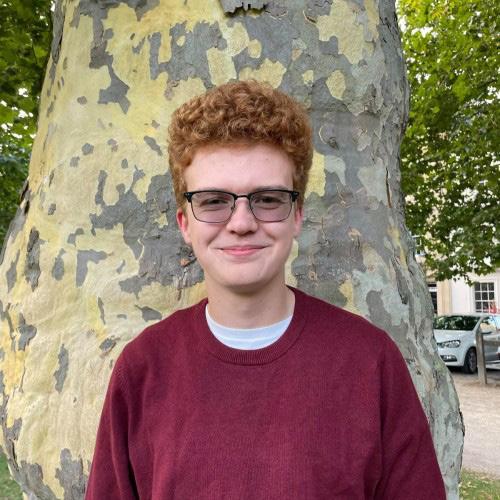
WHAT MADE YOU WANT TO BE EDUCATION OFFICER?
For the last three years. I’ve been the Department Officer for the Physics Department and I’ve gained a lot of experience through that, going into meetings and negotiating with staff to improve the livelihood of students in the Physics Department. I’ve collaborated with people from the Guild, who worked there before and one of them said: “I do this job in the wider University” and Jack, who was an Education Officer a couple of years ago, hinted that the role might interest me. Over time, I realised that people in different departments face the same issues we do in Physics.
WHAT DO YOU THINK THE RESPONSIBILITIES OF EDUCATION OFFICER ARE?
WHAT DO YOU THINK THE UNIVERSITY COULD DO TO HELP REDUCE THE AWARDING GAP AT EXETER?
The Education Officer needs to be very caught up on academic policy, for example things such as mitigation and ILP (Independent Learning Plan) system are going to be important to that role, as well as the delivery of our education on campus. I’ve had experience looking into the ILP system before and I found that there is very little awareness both on the staff and student side of this system. Some students are eligible for this and go through the University and never take advantage of it. Meanwhile, there are lecturers out there who think that sending an email is perfectly fine and that that’s all they need to do. I think that means that educational quality has been lacking for some. If your education isn’t up to your standards, you are going to start losing passion in your subject. As Education Officer candidate, I think a part of that role is to be facilitating people’s passion and education, because that’s something that every single student can relate to.
I think that a lot needs to be done to reconsider how we learn. I think at the moment, both as students and as people interested in education, we are very time poor. We don’t have a lot of time. That means that often there are difficult decisions with regards to our education that can often feel quite unfair. I think one way that the University could address this attainment gap is through supporting mitigation and I also think that going through every single subject and doing workload meetings would be incredibly vital.
WHAT IS YOUR BIGGEST WEAKNESS?
WHAT IS YOUR MOST MEMORABLE EXPERIENCE IN EXETER?
I know that I’m very keen on collaboration and reaching out and listening to people. I think my biggest weakness might be being pulled in too many different directions. An education role is one of the most focused roles of all of the Guild roles, which is why I think it would work for me. I am constantly pulled in many different directions with my passions. Having a single role that is incredibly focused on education side of student lives will be very vital to me, because I sometimes get caught up in doing random things.
For me, I started the Space Exe conference back up. Every year, Stargazing Society and Astronomy Society will have a group of guest speakers come in, some from the University and some from the outside. They will come, speak about Physics and speak about careers in space sector and research in general. We open it up to public, invite all of the local secondary schools, so that their students can come in and hear about their opportunities.
JAMES FAIRWEATHER
I know how to shut up and listen to your concerns. I also know how to fight tooth and nail for your interests.
WHAT MADE YOU WANT TO BE EDUCATION OFFICER?
WHAT DO YOU THINK THE RESPONSIBILITIES OF EDUCATION OFFICER ARE?
WHAT DO YOU THINK THE UNIVERSITY COULD DO TO HELP REDUCE THE AWARDING GAP AT EXETER?
WHAT IS YOUR BIGGEST WEAKNESS?
WHAT IS YOUR MOST MEMORABLE EXPERIENCE IN EXETER?
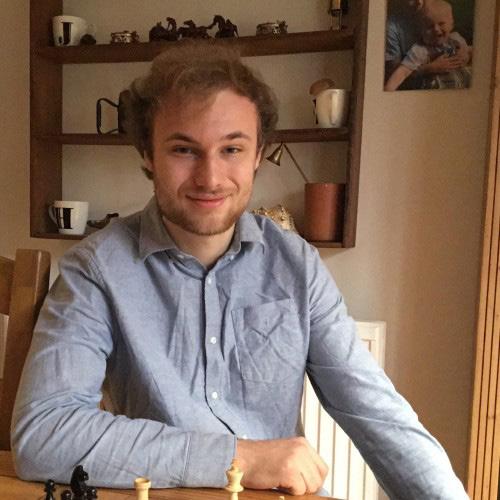
Well, it’s partly because my friend is Education Officer at the moment. And it’s mainly because I was seeing the elections last year and he was running for the role. I kind of got interested after that. I’ve been involved with the Guild as far as I was here. I was Social Secretary for Debating Society. So I know the basics of how it works. But I do really want to make a positive impact in university before I leave. So I thought this would be a good role for me to try and take on, to try and improve a lot of the issues that are currently affecting students.
I think the main one is ultimately trying to basically be a good point of contact for students, at least in terms of if they have an issue with anything that’s going on with their education at the moment. For example, mitigation. The Education Officer kind of serves as someone who can listen to the problems that they are having who isn’t as intimidating. As someone in the Guild, I think the primary role at the end of the day is listening and representation.
I think we definitely need to do a lot more to streamline accessibility, in terms of closing the gap. I doubt there’s that much in a single year. I don’t know how significant the impacts I would be able to make in that amount of time. But there are a lot of things that we can do in terms of accessibility and it’s very important for us to bring up people who may have a longer commute to campus or international students, it might be more difficult in terms of accessibility, especially with the ELE website. So there’s a lot we could do in terms of making it clear where the resources could go to help with mitigation or to help you get advice on your course or even like even the transparency that we have when it comes to understanding what kind of materials you need for your modules.
I think my biggest weakness is I’m a bit shy at times. I would say I’m overall quite introverted. So I do think I need to improve on the fact that I often don’t put myself out there as much when it comes to actively talking to people. Obviously with this role, a big part of it is talking to people, so I definitely need to prepare for this focus on being out there more.
That’s a good question. I think for me, the one that sticks out to me right now, is Winter Ball that we had for Debating Society, which I organised back in December. And that took literally months of going to venues and there was a lot of contact with the Guild over that, and basically brining the whole event together in December last year. Finally having it happen, and basically everyone saying that I did a good job, and seeing people enjoy it, was such a great memory for me. I hold it very close to my heart.
KRISH CHAUDHARY
Hi! I’m a Masters student currently studying Data Science and Stats! I’m from India and I live in the US. My hobbies include building computers, playing games, learning languages, making cocktails, and a lot more! I have ADHD so my attention pretty much goes everywhere… anyways, I hope you support me in the coming elections. I’d bring a fresh outside perspective into the Guild that feels sorely needed to make any effective change, and put my degree to good use in figuring out how to best serve you.
WHAT MADE YOU WANT TO BE EDUCATION OFFICER?
WHAT DO YOU THINK THE RESPONSIBILITIES OF EDUCATION OFFICER ARE?
WHAT DO YOU THINK THE UNIVERSITY COULD DO TO HELP REDUCE THE AWARDING GAP AT EXETER?
WHAT IS YOUR BIGGEST WEAKNESS?
WHAT IS YOUR MOST MEMORABLE EXPERIENCE IN EXETER?

I was inspired by the full-time officers at my old university and what they managed to do. I was under them as a student representative and the kind of stuff they were able to get done was insane. So, when I came to Exeter to do my Masters, I saw the situation of student representation here and I thought that things need fixing here and I could use some of the things they did to have a measurable impact.
I had a chat with the current Education Officer a couple weeks ago and — from what he told me — it essentially concerned meetings speaking to staff, speaking to students. Seeing what kind of changes, they want to make and what kind of direction students want to take education in. For example, if there are more students speaking out for decolonisation then the Education Officer can lobby for senior staff at the University to try to decolonise the curriculum. As well as taking on the role of a trustee, the role is to do with representing students, such as the current Education Officer being able to make the process for mitigation a lot more accessible and a lot smoother than it used to be.
Exeter, as far as I’ve seen, already has the basic measurements where anything racist gets called out and taken care of. There is already a culture in place where Exeter is anti-discriminatory. In terms of equality, you can take the basic steps that everyone takes but after a while it comes down to niche problems and trying to solve them. I’m no stranger to discrimination. For example, when I started my course at Exeter, I was guaranteed accommodation, and I was put in a building where my flat and five others happened to be entirely of international students. People who I could not communicate with or get on with. When I asked about this, I was told that the building was reserved for international students but that alienates me from the local Exeter community. I’m not sure how I would address this exactly but it’s something I could think about and something I would definitely want to address.
I think if I hit a brick wall, I can get unmotivated quite a bit.
I’ve not been in Exeter that long but I would say my part-time job.
I’m a fourth year student, £2 Meal employee and student activist pushing for radical change in our Guild through practical means. Exeter has a severe issue with women and gender minority safety, discrimination, and University investments in arms and fossil fuels. Through my approach of bringing minority students and groups into Guild conversations, not just considering them, I strive for a truly equal Union.
WHAT MADE YOU WANT TO BE COMMUNITIES & EQUALITY OFFICER?
HOW WILL YOU ENSURE ALL GROUPS AND COMMUNITIES ARE REPRESENTED BY THE GUILD?
WHAT IS ONE THING THE GUILD COULD DO IT IMPROVE INCLUSIVITY AMONG ALL GROUPS AND COMMUNITIES?
WHAT IS YOUR BIGGEST WEAKNESS? WHAT IS YOUR MOST MEMORABLE EXPERENCE IN EXETER?
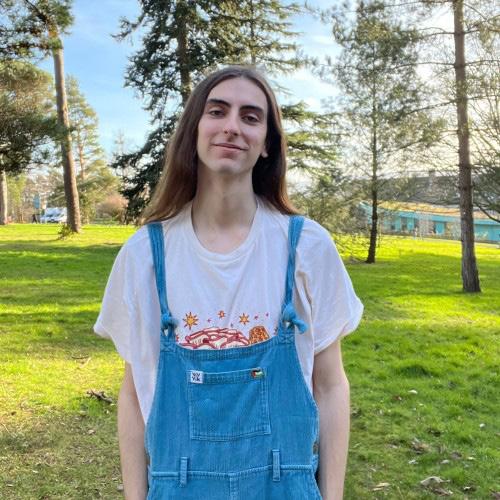
I think in most university cities and in Exeter especially, there’s a real issue with discrimination, bigotry in lots of different forms — particularly with regards to gender minorities’ safety. For example, there was the ‘Ask for Angela’ campaign a few months back, which found that in lots of clubs and bars, the staff weren’t trained on that, which is super dangerous and terrifying, basically. And also, just the fact that this role has the most candidates shows that the students want a general sense of community within the Guild, more equal treatment for all people and especially of minority backgrounds and I very much feel that as a queer person, as a trans+ person and as a student activist as well. So yeah, just sort of an amalgamation of collective feeling and also a personal need to do something.
I think one thing that the Guild tries to do is to include all groups, or group spaces, but they just sort of listen to them and then take that into meetings, whereas I think very much that minority groups should be taken into those meetings. It’s not enough to just consider what certain student groups want, they need to be there to speak for themselves, which is how we can amplify their voices — by actually including them rather than just speaking for them.
I think it should be taking practical measures — so, for example, a lot of universities have implemented soup kitchens to get students to both help with the cost-of-living crisis and to sort of create more of a community around the Guild. So, practical things that both address an issue such as women & gender minority safety or discrimination on campus, but then also separately build a community through, for example, food-related events and social events generally.
I would say my biggest weakness is that I can get quite emotionally invested in the work I do — which is good because it means I am very focused on what I do and I’m passionate about it, but it does mean that if something doesn’t go well, then I very much get stuck on that thing and I want to see it through and make it the best I can do even if it’s something that is contentional to myself.
Definitely being a part of the encampment for Palestine last year, because we were able to create lots of positive change, we got the university to set up working groups, and they eventually distanced themselves from the University of Tel-Aviv, and it also just created a very good community of activism that has continued for almost a year at this point, which is pretty impressive in itself!
KADY BYRNE
I’m Kady-Lee, President of NDSS (24/25), advocate for accessibility and radical inclusivity, and now I’m running for Communities and Equality officer! This year, I have worked to improve the NDSS by introducing new events, arranging external speakers, seeking official sponsorships, and now I’m working on creating a disability aid fund with the Guild!
WHAT MADE YOU WANT TO BE COMMUNITIES & EQUALITY OFFICER?
HOW WILL YOU ENSURE ALL GROUPS AND COMMUNITIES ARE REPRESENTED BY THE GUILD?
WHAT IS ONE THING THE GUILD COULD DO IT IMPROVE INCLUSIVITY AMONG ALL GROUPS AND COMMUNITIES?

So I’ve been working with NDSS for the last two years and I recognise that there wasn’t a lot of representation for people like me before I had gone for those roles and the work that I’ve done with them has been so eye-opening into what can change within the University and how little changes impact people in a big way that I wanted to go for it.
I want to make sure the Guild has more collaboration with societies. They say they go for radical inclusivity but I believe they rely too heavily on societies for them to do this while giving them little support. That hurts people who are religious, international or in marginalised groups because they’re not getting the representation they need because there’s little support or the group just doesn’t exist. So, I want the Guild to be transparent in their processes, making sure students know what’s going on as well as having open forms, talks and discussions where they can get involved with students and hear from them directly. I know they do the superhero surveys and the accountability board but the processes are flawed because it’s people that put themselves forward automatically.
I’d say supporting the students. Some societies want monetary help, some societies just want help with the admin process. I think they just need a way to make things easier for students to access the help they need because currently, there’s the knowledge portal but it’s outdated and it’s not updated regularly so there are things on there that societies have access to in the University but they don’t know about it. So, last year, NDSS campaigned to get an accessible ramp that all societies can hire but there is no information about it online about how to get it so it’s been sitting brand new in a box.
Probably my anxiety — it’s hard to speak in a room sometimes.
WHAT IS YOUR BIGGEST WEAKNESS?
WHAT IS YOUR MOST MEMORABLE EXPERENCE IN EXETER?
I worked at Fever for a week! They weren’t giving me my timetable until two hours before I was scheduled to go in and it’s night shift work so I hadn’t slept in the day thinking I had the day off and then they’d say “oh, can you go and work 12 hours?” and I was thinking “not really!”
OLIVIA WILLIAMS
Hi! I’m Liv, a third year Psychology student. I’m bubbly, open-minded, and compassionate, often found in craft/book shops! I’m also a proud disabled student, my journey has shaped me. Something I want students to know about me is that I listen to understand; I am keen to highlight all voices and make each student feel safe, heard and valued.
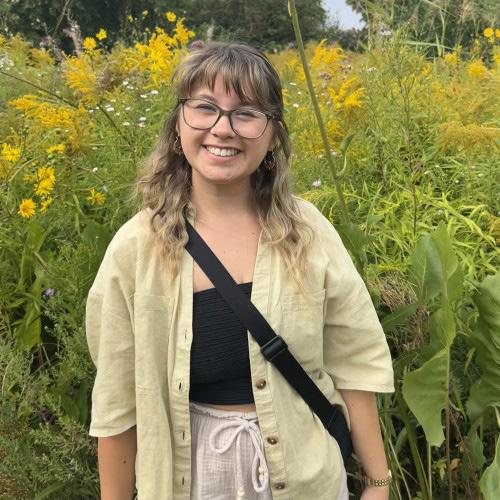
When I was in my first year, I had a friend who was going for the one of the opposite positions and it opened my eyes. I thought, “oh, that’s a really interesting thing at the University that I didn’t know about.” And then in my second year, I did the Community cookbook with Mia, who was the one of the previous Communities and Equalities Officers. Working with her, I got to know a bit more about the role I realised how much of a difference you can make to students. And that really, really appealed to me. That’s why I kind of wanted to go for it and then realised there was a lot that I wanted to kind of bring to the table.
HOW WILL YOU ENSURE ALL GROUPS AND COMMUNITIES ARE REPRESENTED BY THE GUILD?
WHAT IS ONE THING THE GUILD COULD DO IT IMPROVE INCLUSIVITY AMONG ALL GROUPS AND COMMUNITIES?
WHAT IS YOUR BIGGEST WEAKNESS?
WHAT IS YOUR MOST MEMORABLE EXPERENCE IN EXETER?
WHAT MADE YOU WANT TO BE COMMUNITIES & EQUALITY OFFICER? EXCLUSIVE EXEPOSÉ COVERAGE
I think it starts with just truly listening to people. I want every student to feel heard, but also know that they can come to me and feel that they can be vulnerable with me so I can then help them. I think it’s just that it’s really about listening to people. And when I’m passionate about something and I’m passionate about people I’m very determined to get to where I want to with that. So, I think it’s just about true listening, but also making sure people trust you to know that you will listen.
There are obviously so many different groups that could do with support. It’s really difficult to narrow it down to a couple or one. I think for me it’s mainly about awareness of all these different types of issues because I do think the University does do a lot for students, but I don’t think students were always aware of the support that’s there for them, so I think it’s about raising awareness about each issue, and just understanding that there’s so many different types or adversities that students can have. And there’s always things happening alongside studies that might make it more difficult for them to engage. And I think it’s just raising awareness of each of those things, so then we can implement help for those groups.
I’m a disabled student. I wouldn’t say that my disability is a weakness at all. But it does mean that sometimes I’m very hard on myself, which I do think comes from like a place of being quite a determined person. But I definitely can be really hard on myself sometimes, which is definitely something that I’m trying to work on and trying to work on kind of giving myself some of the compassion that I show other people.
I would have to say creating the Chronic Health Peer Support Group. It’s my baby. I’m so proud of it. In my first year, I was really struggling with health stuff and I thought I wanted to make this a positive thing for other people and the whole process of creating it has been a massively positive experience, especially every other week when I facilitate those sessions with students. I just feel like I’m making a really big difference to a small amount of people. It’s just something I’m so proud of.
My name is Rose Arhin and I am a second-year law student running for the Communities and Equality Officer role. Some of my hobbies include dancing and baking — specifically cookies. Growing up, I have always loved debating and advocacy and standing up what is right as I believe that EQUITY for all is the best for community and I am ready contribute to it in the University of Exeter.
WHAT MADE YOU WANT TO BE COMMUNITIES & EQUALITY OFFICER?
HOW WILL YOU ENSURE ALL GROUPS AND COMMUNITIES ARE REPRESENTED BY THE GUILD?
WHAT IS ONE THING
GUILD COULD DO TO IMPROVE INCLUSIVITY AMONG ALL GROUPS AND COMMUNITIES?
WHAT IS YOUR BIGGEST WEAKNESS?
WHAT IS YOUR MOST MEMORABLE EXPERENCE IN EXETER?
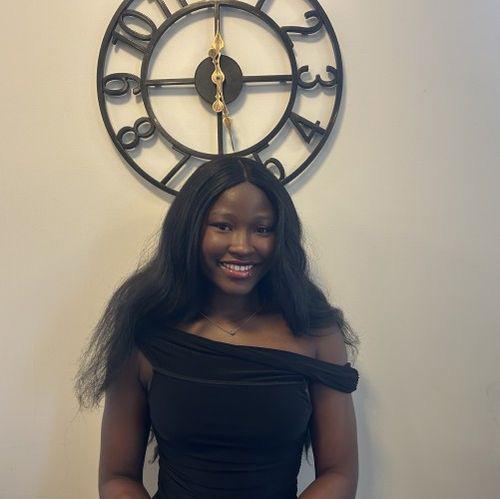
It was my whole journey in Exeter. I came to Exeter as a mature student, so I started university at 21 and I was obviously put with 18-year-olds. I struggled quite a bit and I’ve come to find that Exeter provides a lot of support in terms of mental health and providing societies but at that time, that information didn’t get to me. Because of that, I want to be the person who stands forward and gets that information to everybody, so that nobody has to feel like I did when I first came to university. I know that there is different experiences that everyone might be going through and there are going to be people who are lonely, just because they may not have friends, people who are going to join university too old or too young. I also recognise that things like religion, ethnic minorities and sexual orientation play a big part. I just want to be that person who advocates for a better community. The Guild is already making an effort in terms of societies. For it to be executed better, there should be more collaborations. There should also be more spotlight on smaller societies, as well as encouragement for smaller societies to collaborate with bigger societies to get people to integrate. I’ve especially realised that some international students find it quite hard to participate in big societies. In that case, they can blend in, using social media, trying to talk to societies as well, to engage with it more. With the Guild, using social media more would have a big impact and trying to encourage societies to blend in a little more, so that societies get more representation and students feel more included and more willing to participate.
Make it more accessible to find information. In a lot of cases, the information is there and the University provides a lot of spaces where things can get addressed but the information is not there. I think its’s also just advocating for smaller groups of people. There has been a recent issue with discrimination against Muslims and in a situation like that we need people to believe in the Guild, that they are there for us. It all comes down to reassurance, advocacy and safeguarding, and trying to protect people against discrimination. I’ve noticed that food options at the university, apart from the fact that it’s expensive, it isn’t always inclusive. I know people that have to eat halal but they always have to settle for things like fries because there is no halal chicken on campus.
I would say I am sometimes a bit impatient. In terms of that, it comes from always having to get things done as soon as possible. I found that when you need to listen to people, help them and negotiate with them, you need to have patience to get deep into conversations. I am working on myself and I consider myself a very good listener. I am working on asking more questions to make sure I don’t just try to find a very quick solution, and that I try to be more analytical. I think I’ve improved so much.
In my first year, I tried dance and it was my first dance showcase. I dance as a hobby, my first dance showcase with Legion Dance society was in collaboration with Exeter Dance Society and that was last Spring and it was really fun. I got to bond with a lot of people and self-explore.
ZACH SMITH
Hey, I’m Zach and I’m running to be your next Communities and Equality Officer! I’m a queer and disabled biochemistry student, and I’ve done so much work on LGBTQ+ Soc, NDSS and as a departmental EDI rep! I have loads of experience fighting for positive change in the guild and the university, and I’d love to continue this work as an officer.
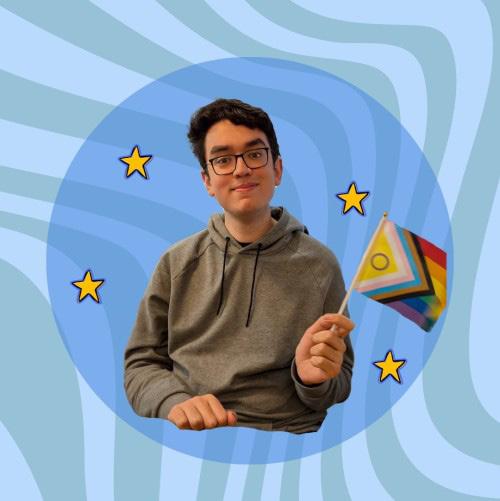
WHAT MADE YOU WANT TO BE COMMUNITIES & EQUALITY OFFICER?
I’ve had endless experience doing EDI (equality, diversity and inclusion) and volunteering things, and I’ve enjoyed it all. I’ve been in LGBTQ+ Society for two years, I was Treasurer last year and I’m Vice President this year. I’m also on NDSS this year, and I’m the EDI rep for my department. I think these things make me the best candidate for the role.
HOW WILL YOU ENSURE ALL GROUPS AND COMMUNITIES ARE REPRESENTED BY THE GUILD?
Accessibility is very important. I’m very interested in doing in-person meetings with all communities, so we can get feedback from them. I want to meet with them all. Also online surveys and anonymous surveys are very important. I want everyone to feel comfortable. It’s really important to have lots of different opportunities and meet as many different people as we can. Rather than being stuck in the Guild office all the time, I want to be able to see everyone.
WHAT IS ONE THING THE GUILD COULD DO IT IMPROVE INCLUSIVITY AMONG ALL GROUPS AND COMMUNITIES?
I think, fundamentally, the Guild works best when it’s more student-led. One of the problems we’ve had this year was working with the Gender Expression Fund. Last year, my friend set that up as a student, and now that they’ve left it’s been limited in how much it can do. I would also say the £2 meal deal was also student-led, and now it’s not £2. Making sure that student-led projects are kept in place and that more student-led projects can happen would make things more inclusive.
WHAT IS YOUR BIGGEST WEAKNESS?
WHAT IS YOUR MOST MEMORABLE EXPERENCE IN EXETER?
In previous years I’ve taken on too much, but this year I’ve really prioritised working on my personal capacity. On NDSS this year, we’re obviously all disabled students, so it’s really important for us to all know our own capacities so that we can work together better and get things done for students.
The LGBTQ+ Society ball last year. We collaborated with NDSS last year, and this year, I’m organising it, and we’re collaborating with Be the Change to make it more sustainable. That’s something I’m really happy with as it’s a massive part of my campaign and who I am as a person.
GEMMA VEAL
My name is Gemma Veal and I’m a final year English and Drama student running for Societies and Employability Officer. This year, I am President of Contemporary Choir and Welfare Officer for the Drama Society. I am passionate about societies and making them accessible and welcoming for everyone! I enjoy performing, zumba, singing, reading, creative writing, and spending time with friends.
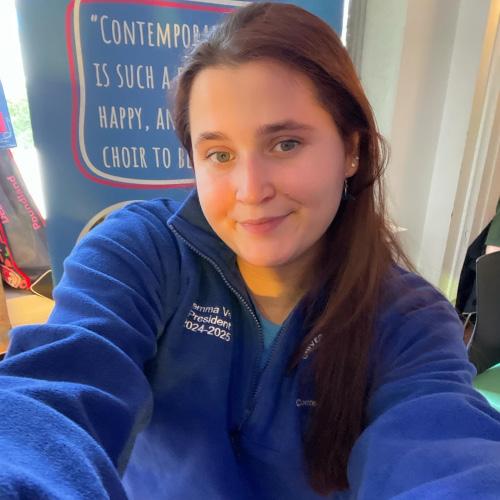
WHAT MADE YOU WANT TO BE SOCIETIES & EMPLOYABILITY OFFICER?
HOW WOULD YOU APPROACH REPRESENTING SOCIETIES EFFECTIVELY IN THE GUILD?
In my three years at Exeter, I have really enjoyed being a part of societies and now I’m on committee for those societies. For me it has always been fun and something to look forward to in my week. Because of how much I have enjoyed being a part of them, I want to make change and I think it’s a job I’d really enjoy and be good at.
WHAT IS THE BIGGEST CHALLENGE YOU WILL FACE IN THE ROLE?
My approach would be to be a friendly face and someone that societies can come to and chat and give feedback. I would want to hear committees’ feedback and make change that way. Having been on committees, I already have some ideas on what is working and what isn’t. I can relate to some problems facing committees, and anything new that comes up I would want to help them by chatting to people with the problem.
I think wanting to make change, but I don’t know how quickly change can happen. I think in this role you are a representative of the Guild and I think there is a pressure that comes with wanting to do a good job.
WHAT IS YOUR BIGGEST WEAKNESS?
WHAT IS YOUR MOST MEMORABLE EXPERIENCE IN EXETER?
I think sometimes I can take on too much and need to re-evaluate how much I can do in a day. Especially as a third year, this I feel like I’m spinning a lot of plates. I know that in this role I would want to be really hands on and get involved in as much as possible, so I would have to try and not do everything at once.
Probably EGB from first year. I performed with my society (Big Band) so I got free tickets which was great. Going on all the rides, and being with so many people. I’ve never been to an event like that before so it was super fun. The highlights of my years are always the society balls. They’re like another enchanted experience, which I’ll look on very fondly in the future.
AADIL PANWHAR
Hello! I’m Aadil, a Masters student at the University of Exeter. I consider myself an accomplished individual with aspirations of achieving great success. I’m known for my commitment, supportiveness, and pedagogical characteristics. My engineering projects have earned me recognition, and I was honored with a long service award for my five years at my previous workplace.
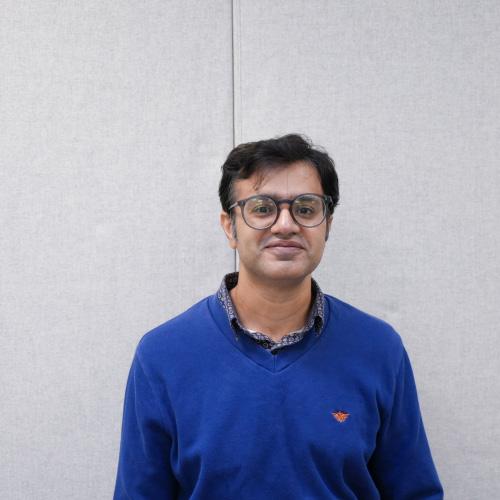
. HOW WILL YOU APPROACH HELPING STUDENTS WITH HOUSING ISSUES?
WHAT MADE YOU WANT TO BE STUDENT LIVING OFFICER?
Interestingly, I had a passion to do extra in my life and I came across the option to apply for Student Living Officer and I was very compelled to look into its details, the responsibilities and role and I was very much into all of those details, interestingly and I felt I can give it a try.
The fact that I’m an international student and I live in this community, I understand the different societies and groups of people here along with their needs and their financial situation and the places they feel like being and the communities they want to be part of. So, understanding diversity and being part of a multicultural environment, I feel like I can do it really well.
WHAT IS THE BIGGEST CHALLENGE YOU WILL FACE IN THE ROLE?
The biggest challenge is coming across students because often, students are interested in being part of a community, living in a certain life however they are not very expressive about it, so that will be a challenge.
WHAT IS YOUR BIGGEST WEAKNESS? WHAT IS YOUR MOST MEMORABLE EXPERIENCE IN EXETER?
My biggest weakness would be not being able to be in a hundred places at the same time.
The Cathedral, especially he moon design by Luke Jerram and his work at the cathedral. I really enjoyed it.
KIRA BROOKES
Hi everyone! I’m Kira, my pronouns are they/them, and I’m absolutely thrilled to be rerunning for the role of Student Living Officer for 2025-26. I’ve been in the position of Student Living Officer since July 2024, and I’ve loved it so much that I wanted to keep going for another year! I’m super friendly, outgoing, and passionate about things like making Exeter safer, improving housing, alleviating the cost of living, and holding the Guild more accountable at a time where students are feeling powerless.
WHAT MADE YOU WANT TO BE STUDENT LIVING OFFICER?
HOW WILL YOU APPROACH HELPING STUDENTS WITH HOUSING ISSUES?
WHAT IS THE BIGGEST CHALLENGE YOU WILL FACE IN THE ROLE?
WHAT IS YOUR BIGGEST WEAKNESS?
WHAT IS YOUR MOST MEMORABLE EXPERIENCE IN EXETER?
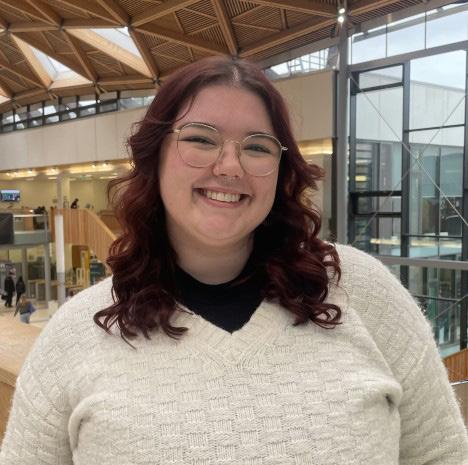
The original reason I ran last year was because of the amount of experiences I’d had as a student that really highlighted where the University has failed students. Student Living Officer was a really fun and powerful opportunity to get involved and be a part of shaping something better. Since I’ve been doing the job, it’s been so rewarding, but I still have so much more that I want to accomplish. I figured I’d run for it again and see through a lot of the projects that I’ve started.
An important part of this is making sure that students are aware of the rights that they have. I think there’s a huge problem with information not being accessible to students, both in terms of actually finding it and understanding it. Breaking that down and making sure it’s something that’s really easy to understand is crucial. There’s been a lot of talk in government about how we can improve rights and access to housing for students, including through the Renters’ Rights Bill, which is really promising for students, it’s got a lot of different things that are going to really help improve housing for students. In terms of Exeter more specifically, one of the things that we’ve done this year is meet with the local MP, Steve Race, and specifically highlight the issue of housing in Exeter in terms of quality and affordability.
One of the biggest challenges that I’ve faced has been managing expectations. When I got into the role in the first place there were a lot of things I really wanted to accomplish but at the time I didn’t know how much it was going to take and what the timeline would be. That is something that becomes apparent as we’re trying to do it. I’ve been working on a project that requires funding from the Council, and that has taken a long time to actually get to a position where we’re ready to start working on it. In terms of the biggest challenges that I think I will face, I think that there is a big lack of trust in the Guild right now. I think a lot of students are feeling quite powerless, and that’s something that’s really hard to see. In turn, it becomes really hard to engage with students, and that’s one of the things that I really love doing, it’s one of my favourite parts of the job. Trying to engage with students who don’t have the time, or the capacity, or the trust in the Guild is something that I expect to be a really big problem.
I think that a part of it is the expectation management. I think having high hopes is a really positive thing, and wanting to achieve a lot is a really positive thing, but it can be quite easy to get disheartened if things don’t work out the way that you wanted. That’s something that I struggled with this year and something that I think I will continue to struggle with, but I think that it’s really important in that situation to show resilience and think outside of the box to find other ways to get around the problems that you’re facing.
For the past two years now I’ve been part of organising the attendance for Reclaim the Night, which is really, really powerful. It’s an amazing opportunity, and this year I actually worked directly with Devon Rape Crisis themselves, who organise the march, and I’ve had a fairly consistent relationship with them over the time that I’ve been in the job. Reclaim the Night is always a really amazing night.
There are two candidates running this year for the position of Guild President. Both candidates spoke of their intention to have an impact on the Students’ Guild and on the student population, whether that be to help with mental health, housing issues or other matters. The candidates were also clear-eyed about the challenges they would face in the role. Whether that be coping with the current state of the Higher Education sector or the high expectations that may come with the role, both contenders took seriously the responsibilities of the role of Guild President.
The incumbent Sports President is running to hold the position of Sport President for a second consecutive year. She discussed building on her record over the past year, such as by focusing on a few projects to implement over the next year and continuing to ensure that sport at Exeter is accessible for every type of student.
The most hotly contested role in this year’s elections, Exeposé were able to discuss the job of Communities & Equality Officer with all five candidates. Everyone took a different perspective to the role. Some candidates focused on the safety of students from issues like discrimination and bigotry while others instead emphasised improving the experience of all students, including mature students. However, many of the candidates touched on similar themes of accessibility and listening to the student population to improve their experiences.
For the next year, the role of Societies & Employability Officer will involve helping and collaborating with society committees, such as by taking in their feedback and implementing their suggestions. The theme of change in particular was emphasised.
(
The three candidates running for the role of Education Officer were keen to make progress on the academic experience at Exeter. The candidates wished to build on recent progress on matters like mitigation and Independent Learning Plans (ILPs) made in previous years. All the candidates spoke about improving the learning experience for all students so that, whoever they may be, they have as many opportunities and as good a chance as possible at succeeding. Candidates suggested improving accessibility and making further adjustments to the mitigation process for these ends.
The three candidates running for the role of Education Officer were keen to make progress on the academic experience at Exeter. The candidates wished to build on recent progress on matters like mitigation and Independent Learning Plans (ILPs) made in previous years. All the candidates also spoke about improving the learning experience for all students so that, whoever they may be, they have as many opportunities and as good a chance as possible at succeeding. Candidates suggested improving accessibility and making further adjustments to the mitigation process for these ends.
(Exeposé were not able to speak to Yanyan Qian who is also running for the role)
